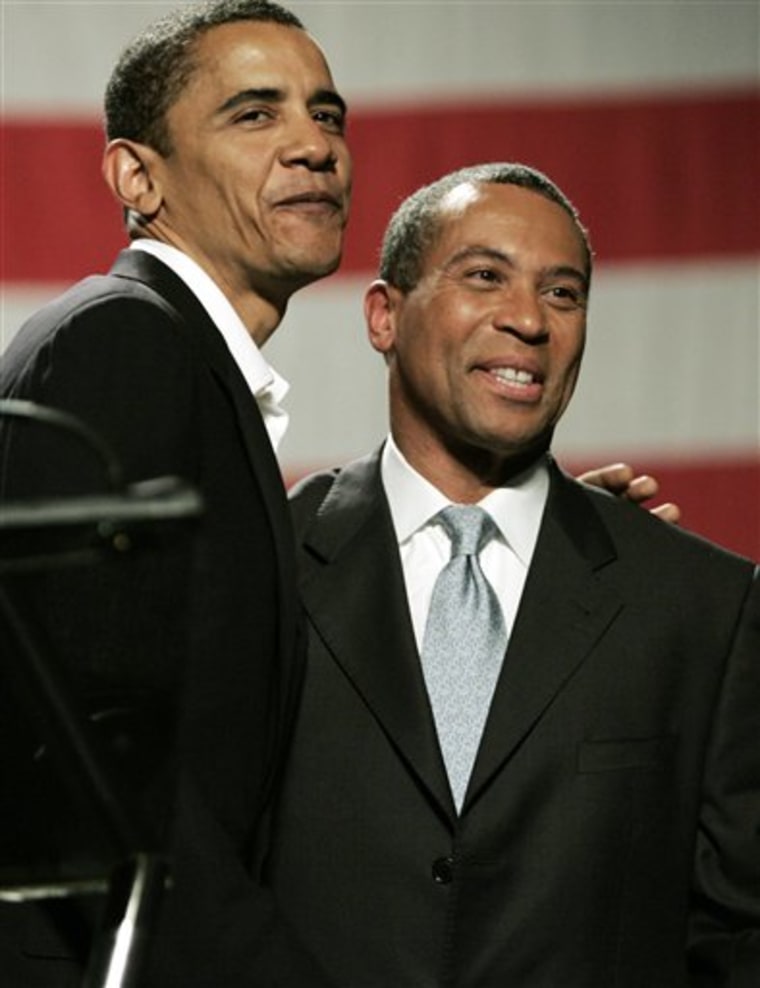Early in Deval Patrick's run for governor, when few Massachusetts voters had heard of the maverick candidate with the odd first name, U.S. Sen. Barack Obama stopped by Cambridge for a class reunion at Harvard Law School.
Obama extolled the virtues of Patrick, a fellow Harvard Law School alum who, like Obama, faced better known and better financed opponents.
"He recognized that there was something very special about Deval and there were similarities in their experience," said Cassandra Butts, an Obama classmate who attended the reunion. "He wanted to give Deval the chances that he didn't have early on in his Senate race."
As Obama campaigns for president and Patrick works to shake off a rocky start as governor, observers are seeing in the two old friends the new face of black political leadership - figures as comfortable in the boardroom as on the picket line who can appeal to large swathes of white voters.
Beyond the rhetoric
Both candidates share similar life stories, rising from modest means with the help of family and education.
For Obama, it meant Columbia University before Harvard Law School, where he was the first black president of the Harvard Law Review. For Patrick, who grew up in the shadow of the Robert Taylor Homes housing project in Chicago, it meant Milton Academy before Harvard University and Harvard Law.
They also share a political language ringing with themes of hope, new beginnings, and citizen-friendly government. At times they seem to be reading off the same script.
"They've moved beyond the rhetoric of the civil rights generation," said David Gergen, a former White House aide now teaching at Harvard University's John F. Kennedy School of Government.
"They accept the nobility of that generation ... but they believe there are new solutions," he said. "We are in a new age where these new black politicians are not just trying to appeal to a broad base of voters, but they are succeeding."
While Patrick welcomes the "new" label, he balks at the idea that the only reason he and Obama are seen as different is because they haven't focused exclusively on civil rights.
"It's an oversimplification. It's a dimension of him, it's a dimension of me," Patrick, who worked for the NAACP Legal Defense Fund early in his career, said in an interview with The Associated Press. "Black politicians haven't come solely from the civil rights movement. Not here in Massachusetts, not anywhere in the country.
"I think what made a difference for me here is not one thing. What made a difference for me here was in some ways a moment in time," he added.
Flucuating popularity
Obama and Patrick share a friendship stretching back to Patrick's days heading the civil rights division of the Clinton era Justice Department, when Obama was trying to launch a political career in Patrick's home state of Illinois.
While Patrick landed top jobs at Coca-Cola and Texaco, Obama shot through the political ranks, winning a seat in the state Legislature.
In 2004, Obama became the first black man from Illinois to win a seat in the U.S. Senate. Two years later, Patrick, in his first run for office, became the first black governor of Massachusetts.
While Patrick remains popular, his first months were plagued by missteps, from upgrading his official car to a Cadillac to placing a call to Citigroup on behalf of a struggling lending company on whose board he once served.
Critics of Patrick and Obama worry that voters are being swayed by personality and a lingering desire to right past racial injustices.
"My real issue is with voters who vote for a complete stranger just because he's nice looking and well spoken and makes them feel good for voting for a black candidate," said Barbara Anderson, an anti-tax activist who supported Patrick's Republican opponent. "They get too caught up in the charisma."
After campaigning in New Hampshire on Friday, Obama is scheduled to go to Boston to kickoff his New England campaign.
